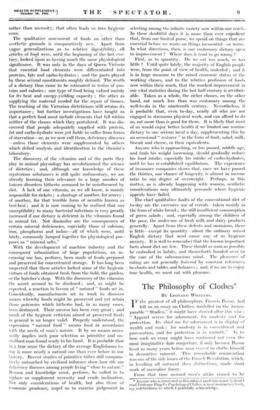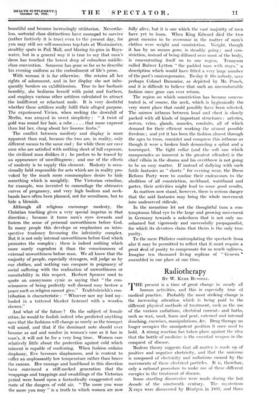The Philosophy of Clothes*-
By LEONARD WILLIAMS.
IF the greatest of all philosophers, Francis Bacon, had left us an essay on Clothes, modelled on the incom- parable " Studies," it might have started after this wise : " Apparel serves for adornment, for modesty and- for protection. Its chief use for adornment is in dissj)lay of wealth and rank ; for modesty is in concealment and provocation, and for protection is in warmth." Asto how such an essay .might have continued not even the most imaginative dare conjecture, if only because Bacon lived so many years before man ceased to clothe himself in decorative raiment. This remarkable renunciation was one of the side issues of the French Revolution, which, in levelling all outward class diStinctions, made short work of masculine finery. • From that time onward man's attire ceased to be * Anyone who is interested in this subject (and who is not 7) shout'''. read Professor Flugel's Psychology of Clothes, a most instructive hook, my indebtedness to which I gratefully acknowledge. beautiful and became increasingly utilitarian. Neverthe- less, sartorial class distinctions have managed to survive (rather furtively it is true) even to the present day, for you may still see self-conscious top-hats at Westminster, stealthy spats in Pall Mall, and blazing tie-pins in Bays- water, but in a general way it is true to say that man's 'dress has touched the lowest deep of colourless middle- class convention. Someone has gone so far as to describe his evening uniforrri as the *embodiment of life's prose.
With 'woman it- is' far otherwise. She retains all her rights of adornment, and in her display she not infre- quently• borders- on exhibitionism. True to her barbaric heredity, she bedizens herself with paint and feathers, and employs various other artifices calculated to attract the indifferent or reluctant male. It is very doubtful whether these artifices really fulfil their alleged purpose. The experienced. Vivien, when seeking the doWnfall of Merlin, was arrayed in sweet simplicity : " A twist of -gold was round her hair, a,robe . . . that more expresst than hid her, clung about her lissome limbs."
The conflict between 'modesty and display is more apparent than real,-because.the two are, in reality, only different means to the same end'; for while there are cave men who are satisfied with nothing short of full exposure, the civilized man dislikes it ; he prefers to be teased by an appearance of unwillingness ; and one of the effects of modesty is to supply thisi element. Modesty is occa- sionally held responsible for acts which are in reality pro- voked by the much more commonplace desire to hide something which is unsightly. The Victorian crinoline, for example, was invented to camouflage the obtrusive curves of pregnancy, and very high bodices and neck- bands have often .been planned, not for seemliness, 'but to hide a blemish. • .
Although all religions encourage modesty, the Christian teaching gives a very special impetus in that direction ; because it turns men's eyes inwards and fosters the sense of personal unworthiness • before God. In many people this develops or emphasizes an intro- spective tendency favouring the inferiority complex. But it is not only internal unworthiness before God which promotes the complex ; there is indeed nothing which more surely engenders it than the consciousness of external unworthiness before man. We all know that the majority of people, especially strangers, will judge us by our clothes, and nothing can compare in poignancy of social suffering with the realization of unworthiness or unsuitability in this respect. Herbert Spencer used to quote an anonymous cynic as saying that " the con- sciousness of being perfectly well dressed may bestow a peace such as religion cannot give." Teufelsdrockh's con- tribution is characteristic : -" Whoever saw my lord my- lorded in a tattered blanket fastened with a wooden skewer."
And 'what of the future ? On the subject of female attire, he would he foolish indeed who predicted anything save that the fashions will change as surely as the trumpet will sound, and that if the dominant note should ever become as sad and sombre in woman's case as it has in man's, it will not be for a very long time. Women care relatively little about the protectiOn against cold which raiment is capable of conferring. When fashion ordains diaphany, Eve becomes diaphanous, and is content to suffer an unpleasantly low temperature rather than brave the canons. Her courage and hardihood in this direction have convinced a stiff-necked generation that the wrappings and trappings and swaddlings of the Victorian period were based upon a fantastically exaggerated esti- mate of the dangers of cold air. " The more you wear the more you may " is 'a truth to which women are now fully alive; but it is one which the vast majority of men have yet to learn. When King Edward died the 'two great enemies to be overcome in the matter of men's ;clothes were weight and constriction. Weight, though it has by no means gone, is steadily going ; and- con- striction, instead of being diffused over most of the body, is concentrating itself on to one region. Tennyson called Bulwer Lytton " the Padded man with stays," a description which would have fitted a very large number of the poet's contemporaries: To-day it fits nobody, save perhaps Colonel Damurise, as depicted by Mr. Punch, and it is 'difficult -to believe that such an uncomfortable fashion once tone can ever return.
- The region ori which constriction has become concen- trated is, of course, the neck, which is hygienically the very worst place that could possibly have been :selected. - The narrow isthmiis between head and chest is closely packed with all kinds of important structures : arteries, nerves, veins, glands, muscles, conduits, all of which demand for their efficient working the utmost possible freedom ; and yet-it has been the fashion almost through the ages to truss, constrict and compress this isthmus as though it were a broken limb demanding a splint and a tourniquet. The tight collar (and the soft one which masquerades as innocent is the greatest offender) is the chief villain in the drama. and his overthrow is not going to be an easy matter. If instead of dallying with such futile fantasies as " shorts " for evening wear, the Dress Reform Party were to confine their endeavours to the abolition of all constriction, neckband, waistband and garter, their activities might lead to some good results. As matters now stand, however, there is serious danger that the said fantasies may bring the whole movement into undeServed In the meantime let not the thoughtful turn. a con- temptuous blind -eye to the large and growing movement in Germany towards 'a nakedness that is not only un- ashamed but vigorously and successfully propagandist, for which its devotees claim that theirs is the only true purity.
To the mere Philister contemplating the spectacle from afar it may be permitted to reflect that it must require a great deal of purity to compensate for so much ugliness.. Imagine ten thousand living replicas of " Genesis * assembled in one place at one time.



















































 Previous page
Previous page